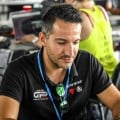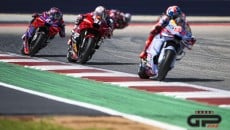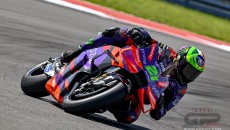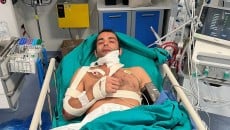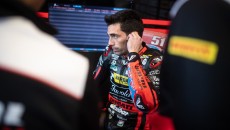It's not like other races, where riders complete a set number of laps around one particular track. Rather than a race, it is better defined as an adventure, one that combines joy, pain, anger, fear and tension. On the one side there is nature and on the other, humankind, bravely pushing on into the unknown, moving the goalposts and embarking on a journey of self discovery, preferring at times to rely on intuition rather than an electronic device.
The 40th edition of the Dakar, which gets underway on Saturday in Lima, will be number six for Alessandro Botturi. Once again the Yamaha rider will fly the flag for Italy while also leading his country's platoon. Here he gives us real insight into the RAID.
“As you know, I'm not on the factory team this year. This is an advantage, in that I'll be under less pressure and, in some respect, I'm not obliged to score a result at all costs”.
You've often said that the Dakar is a race that is run together with one's team.
“Of course. You spend more than twenty days with the team and the guys essentially become like family. Their contribution is essential, not just in terms of the technical side, but also in terms of morale, as you're always shattered by the evening and so chatting with the group is good for the mind”.
How is a Dakar rider's day structured?
“You get out of bed at 3am and by 4am you're already on the bike – he explains - because there are transfers and then the stages. I usually reach the end of the stage around 4 in the afternoon, I spend five minutes with the mechanic to provide feedback and then it's straight into the shower. That's one of the moments I look forward to, taking off my gear after twelve long hours”.
It doesn't end there though, right?
“Right, I eat something quick and then sleep for an hour. Resting post-stage is essential, because you then need to study the road book and you need to be lucid as it can take 1.5/2 hours. Then there's the briefing and preparing everything for the following day”.
You need to be meticulous, preparing every last detail.
“In the Dakar, you need consistency, patience and determination. Mentality makes the difference, as each day you are already focusing on the next and you can't afford to be ill-prepared. You reach high ground and know you need to be carrying an altitude sickness pill with you or when there are dunes you need seasickness tablets. You can't underestimate anything”.
What does the Dakar represent for Alessandro Botturi?
“I've always been a fan of this specialism. It's a real adventure that marks you for life. Once you've competed in it, you realise why you get the Africa Blues, just a month after it finishes you're already thinking about the next one. There are various aspects to coordinate, from physical preparation to the financial side, which has a certain weight of course”.
So, this RAID has a place in your heart?
“Exactly, it's a part of me, I'm attached to it and feel that I am a true Dakarian”.
Alessandro, let's move on to the race. Last year things didn't go to plan unfortunately.
“It was a pity about the five-minute penalty at the start and then the other twenty-minute penalty. Then came the crash that sent my hopes up in smoke. In a race like this, you need to try to limit the risks, try to keep them at a distance”.
The 2018 edition could be a good opportunity for a comeback. What's your motivation?
“Unfortunately, this event comes on the back of two complicated previous editions. I'll do all I can to be consistent and keep the kind of pace I had in the Panafrica. The aim is to finish the race and try to stay inside the top ten. Physical form is everything, you can sometimes train to excess before the RAID and that can leave you fatigued.”
The Dakar has three parts this year, with Perù in addition to Bolivia and Argentina. What are the key stages do you think?
“In week one I expect a compact group, with contained gaps. We'll already be at high altitude during the third and fourth stages, then the rest day comes in La Paz, at 4000 metres. It won't be easy to recharge considering the altitude. The real difficulties will come when we reach Argentina, the Belen and Fiambalà stages in particular”.
Finally, who is the man to beat - Sunderland or Price?
“The KTMs are the favourites, but I'd also keep an eye on Matthias Walkner. He's very fast and was competitive in Morocco. Then there's Honda with Barreda and Yamaha”.



